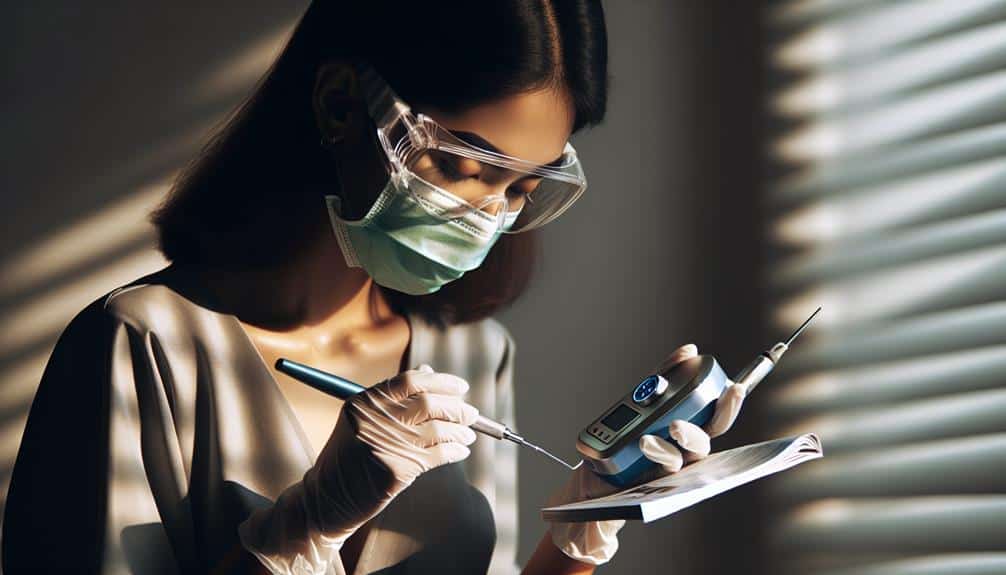To steer clear of whitening tooth infection risks, prioritize your oral health by attending routine dental check-ups to catch any existing issues pre-whitening. Opt for dentist-recommended whitening products to guarantee safe and effective results, as these products are expertly formulated to minimize risks like sensitivity or enamel damage. Avoid the temptation of DIY whitening without professional guidance, as it can lead to potential complications. Be vigilant for signs of infection post-whitening such as persistent pain, swelling, or sensitivity, and remember that timely intervention plays a key role in managing any post-whitening concerns.
Key Points
- Prioritize regular dental check-ups before whitening.
- Use dentist-recommended whitening products for safety.
- Avoid DIY whitening without professional guidance.
- Watch for signs of infection post-whitening treatment.
- Maintain good oral hygiene to prevent infection risks.
Understanding Tooth Infections Before Whitening
Before proceeding with whitening treatments, it's vital to understand the potential risks associated with tooth infections to ensure a safe and effective outcome. Grasping the tooth anatomy and infection causes is pivotal in this respect. The tooth comprises different layers: enamel, dentin, and pulp. The enamel is the hard, outer layer that safeguards the tooth, while the dentin is situated beneath the enamel, offering support. The pulp, positioned at the core of the tooth, contains nerves and blood vessels.
Tooth infections can arise when bacteria infiltrate the tooth via cavities, fractures, or dental trauma. Inadequate oral hygiene, a diet rich in sugary foods, and a lack of routine dental check-ups can heighten the infection risk. When bacteria access the pulp, they can trigger inflammation and infection, leading to discomfort, swelling, and potential complications if not addressed.
Importance of Dental Check-ups Pre-Whitening
Routine dental examinations are necessary before proceeding with any whitening treatments to guarantee excellent oral health and safety. Preventive measures, such as regular dental check-ups, play an important role in ensuring that your teeth and gums are in top condition before undergoing any whitening procedures. These check-ups allow your dentist to assess your overall dental hygiene, identify any existing issues that may need to be addressed before whitening, and provide personalized recommendations for the best course of action.
During these check-ups, your dentist will conduct a thorough examination of your teeth and gums to check for any signs of decay, infection, or other oral health problems. By addressing these issues proactively, you can reduce the risk of complications during or after the whitening process. Additionally, your dentist can recommend specific dental hygiene practices to follow both before and after whitening to maintain the health and appearance of your teeth.
Incorporating regular dental check-ups into your oral care routine is a proactive approach to safeguarding your oral health and ensuring successful whitening outcomes. By prioritizing preventive measures like dental examinations, you set yourself up for a brighter, healthier smile.
Using Dentist-Recommended Whitening Products
When considering teeth whitening, using dentist-recommended whitening products is essential for achieving safe and effective results. Dentist-recommended products undergo rigorous testing to guarantee their effectiveness in whitening teeth without causing harm. These products are formulated with the right balance of whitening agents to provide noticeable results while minimizing the risk of sensitivity or damage to the enamel.
Dentist supervision is vital when using whitening products to make sure that they're suitable for your teeth and gums. Dentists can recommend the most appropriate products based on your oral health and the level of whitening you desire. Their guidance can help you avoid potential risks associated with using the wrong products or applying them incorrectly.
Avoiding DIY Whitening Without Professional Consultation
To guarantee the safety and effectiveness of your teeth whitening process, it's important to refrain from starting on self-administered whitening treatments without seeking professional consultation. Consulting a dentist before beginning any DIY whitening methods offers numerous benefits. Dentists can assess your oral health status, identify any pre-existing conditions that may affect the whitening process, and recommend the most suitable whitening approach tailored to your specific needs.
By skipping this essential step, you expose yourself to various DIY dangers that could harm your teeth and gums.
DIY whitening without professional guidance may lead to overuse of whitening agents, causing tooth sensitivity, gum irritation, or even enamel damage. Additionally, without a proper examination, underlying dental issues like cavities or gum disease may go unnoticed, exacerbating potential problems during the whitening process.
To mitigate these risks and guarantee a safe and successful teeth whitening experience, it's highly recommended to prioritize consultation with a dental professional before proceeding with any at-home whitening treatments.
Signs of Infection Post-Whitening Treatment
After completing a whitening treatment, be vigilant for any signs of infection that may manifest in your oral cavity. Proper care and early intervention are vital in managing any post-whitening treatment complications.
Here are some signs of infection to watch out for:
- Critical: If you experience continuous or increasing pain in your teeth or gums after a whitening treatment, it could indicate an underlying infection that requires attention.
- Essential: Swelling in the gums, cheeks, or other areas of the mouth can be a sign of infection. If the swelling persists or worsens, consult your dentist promptly.
- Crucial: While some sensitivity after whitening is normal, if it persists for an extended period or becomes more severe, it might be a sign of an infection that needs to be addressed.
Frequently Asked Questions
Can Tooth Infections From Whitening Procedures Lead to Serious Health Complications?
Avoiding whitening tooth infection risks is vital for your overall health. Tooth infections from whitening procedures can indeed lead to serious complications. Stay diligent with oral hygiene and prioritize your dental health to prevent potential issues.
How Long Should I Wait After a Dental Check-Up Before Starting a Whitening Treatment?
After a dental check-up, wait at least two weeks before beginning a whitening treatment. Rushing into it can increase side effects and harm your teeth. Always consult a professional for guidance on safety precautions.
Are There Any Specific Ingredients in Whitening Products That Can Increase the Risk of Infection?
You won't believe the hyperbolic effect some ingredients in whitening products can have on infection risks. Stay vigilant about product safety to avoid potential harm. Educate yourself on ingredient risks for a healthier smile.
What Are the Potential Dangers of Using DIY Whitening Kits Without Consulting a Professional?
Before using DIY kits, it's essential to understand the potential dangers. Without professional consultation, you risk harming your teeth and gums. Take precautions; seek advice to guarantee the benefits outweigh the risks associated with at-home whitening treatments.
How Soon After a Whitening Treatment Should I Seek Medical Attention if I Suspect an Infection?
After a whitening treatment, it's important to monitor post-treatment changes. If emergency symptoms like severe pain or swelling arise, don't delay seeking medical attention. Prompt care is key to a smooth recovery process.



